- Arbitration
- Banking & Finance
- Capital Markets
- Commercial
- Competition
- Construction & Infrastructure
- Corporate / Mergers & Acquisitions
- Corporate Services
- Corporate Structuring
- Digital & Data
- Dispute Resolution
- Employment & Incentives
- Family Business & Private Wealth
- Innovation, Patents & Industrial Property (3IP)
- Insurance
Find a Lawyer
Book an appointment with us, or search the directory to find the right lawyer for you directly through the app.
Find out more
Level Up: Unlocking Financial Potential In The Middle East
Welcome to this edition of Law Update, where we focus on the ever-evolving landscape of financial services regulation across the region. As the financial markets in the region continue to grow and diversify, this issue provides timely insights into the key regulatory developments shaping banking, investment, insolvency, and emerging technologies.


2025 is set to be a game-changer for the MENA region, with legal and regulatory shifts from 2024 continuing to reshape its economic landscape. Saudi Arabia, the UAE, Egypt, Iraq, Qatar, and Bahrain are all implementing groundbreaking reforms in sustainable financing, investment laws, labor regulations, and dispute resolution. As the region positions itself for deeper global integration, businesses must adapt to a rapidly evolving legal environment.
Our Eyes on 2025 publication provides essential insights and practical guidance on the key legal updates shaping the year ahead—equipping you with the knowledge to stay ahead in this dynamic market.
The leading law firm in the Middle East & North Africa region.
A complete spectrum of legal services across jurisdictions in the Middle East & North Africa.
-
Practices
- All Practices
- Banking & Finance
- Capital Markets
- Commercial
- Competition
- Construction & Infrastructure
- Corporate / Mergers & Acquisitions
- Corporate Services
- Corporate Structuring
-
Sectors
-
Country Groups
-
Client Solutions
Today's news and tomorrow's trends from around the region.
17 offices across the Middle East & North Africa.
Our Services
 Back
Back
-
Practices
- All Practices
- Banking & Finance
- Capital Markets
- Commercial
- Competition
- Construction & Infrastructure
- Corporate / Mergers & Acquisitions
- Corporate Services
- Corporate Structuring
- Digital & Data
- Dispute Resolution
- Employment & Incentives
- Family Business & Private Wealth
- Innovation, Patents & Industrial Property (3IP)
- Insurance
- Intellectual Property
- Legislative Drafting
- Private Client Services
- Private Equity
- Private Notary
- Projects
- Real Estate
- Regulatory
- Tax
- Turnaround, Restructuring & Insolvency
- White Collar Crime & Investigations
-
Sectors
-
Country Groups
-
Client Solutions

Jurisdiction of the Federal Supreme Court: Federal Supreme Court Judgment 2 of 2019
Mosaab Th. Aly - Senior Counsel - Litigation
Zane Anani, Senior PSL
 Introduction
Introduction
This case concerns a conflict of jurisdiction involving two conflicting final decisions: an award of the Dubai International Arbitration Centre (‘DIAC’) that was ratified by the judicial committee on civil disputes between Dubai Holding and Dubailand and their subsidiaries (‘DIAC arbitration proceedings’); and another judgment issued by the Dubai Court of Cassation, which appeared to concern an identical cause of action involving the same subject matter and parties (‘Dubai court proceedings’). Notwithstanding that the Federal Court had jurisdiction to decide on the conflict it chose to cede jurisdiction to the local Dubai court to resolve the conflict instead.
Background
The parties to the Dubai court proceedings were in dispute over ownership rights to a plot of land in Dubai. The Claimant prevailed in that case, with judgment declaring the Claimant to be the freehold owner of the plot.
During the Dubai court proceedings, the Defendant commenced arbitration before the DIAC to recover the plot that was the subject of the development agreement. The arbitral tribunal issued an award ordering the return of the plot of land to the Defendant and the refund of the purchase price paid by the Claimant.
The Claimant filed a case before the Dubai Court of First Instance to annul the award. The Defendant argued that the Dubai Court of Instance did not have jurisdiction to hear the case on the basis that a special committee (pursuant to Dubai Ruler’s Resolution 15 of 2018) had exclusive jurisdiction. When the Defendant filed a case concerning the arbitration award before the committee, the committee issued an order to ratify and enforce the arbitration award. The Claimant filed a grievance but this was dismissed.
A contradiction therefore arose between the two judicial rulings. Consequently, the matter was required to be resolved pursuant to Article 60 of Federal Law No. 10 of 1973.
The Defendant argued that the Federal Supreme Court had no jurisdiction to hear the dispute because the committee that issued the arbitral award is part of the judicial system of the Emirate of Dubai, which rendered the conflict an internal matter.
Conflicts of Jurisdiction between Judicial Bodies in the Same Emirate
The legislature has defined the jurisdiction of the Federal Supreme Court in Article 99 of the Constitution, and in Article 33 of the Federal Supreme Court Law (Federal Law No. 10 of 1973). Article 33 (10) of Federal Law No. 10 of 1973 establishing the Supreme Federal Court provides that the Federal Supreme Court shall have exclusive jurisdiction to determine disputes in conflicts of jurisdiction between judicial bodies in the same emirate. Article 60 of the Federal Supreme Court Law provides examples of such conflicts and states that in the case of a conflict of jurisdiction between two or more judicial bodies, as referred to in Article 33, if those judicial bodies do not waive their jurisdiction, or if they all waive their jurisdiction, or if conflicting judgments are given, then the matter shall be raised before the Supreme Court to determine which of those courts will have jurisdiction.
In this case, the Claimant argued that there was a conflict between two judgments (one was issued by the Dubai Courts and the other was an arbitral award ratified by a Special Judicial Committee that adjudicates disputes concerning Dubailand). The Claimant requested the Federal Court to resolve the alleged conflict and confirm that the Court of First Instance decision should be enforced, not the award.
Al Tamimi & Company appeared for the Defendant before the Federal Supreme Court. We argued that the Federal Supreme Court had no jurisdiction to rule on the alleged conflict. We also argued that where there is a conflict between two judicial bodies in the same emirate; the Federal Court should not interfere provided that emirate has its own judiciary.
The Federal Supreme Court accepted both submissions. First, it declined to apply Article 33 of Federal Law No. 10 of 1973 to the conflict. Second, it confirmed that the local judiciary of the particular emirate, in this case, Dubai, should resolve the conflict internally.
Commentary
The judgment is both interesting and significant because in general there is no authority or mechanism, at this stage, which is empowered to rule on jurisdictional conflicts between special judicial committees, the judgments of which are final and not subject to any appeal, and any other judicial body in the Emirate of Dubai.
Conflicts of jurisdiction between two judicial bodies within an emirate must be resolved by the Federal Court (pursuant to Articles 99 of the UAE Constitution and 33 and 60 of the UAE Civil Procedure Law). However, with the proliferation of special committees and autonomous legal systems within emirates, the Federal Courts have taken a sensible decision to delegate the power to resolve such conflicts to the local judiciary. This is a reassuring and sensible decision that ought to help reduce unnecessary expense and delay.
Finally, the decision does not affect the standing of the Judicial Body of Dubai Courts and DIFC Courts which determines conflicts of jurisdiction between the Dubai Courts and the DIFC Courts.
Al Tamimi & Company’s Litigation and Arbitration teams regularly advise on the enforcement of arbitration awards and judgments. For further information please contact Mosaab Aly (m.aly@tamimi.com).
Stay updated
To learn more about our services and get the latest legal insights from across the Middle East and North Africa region, click on the link below.


